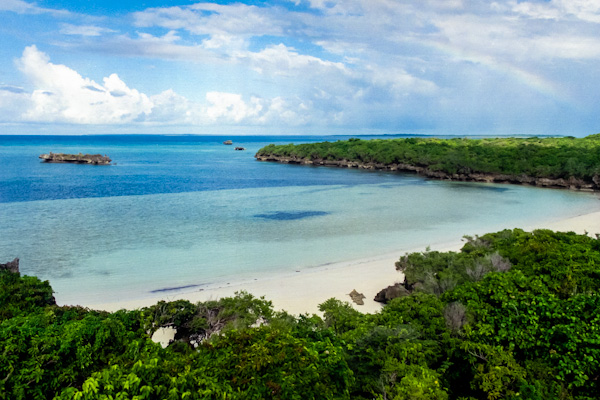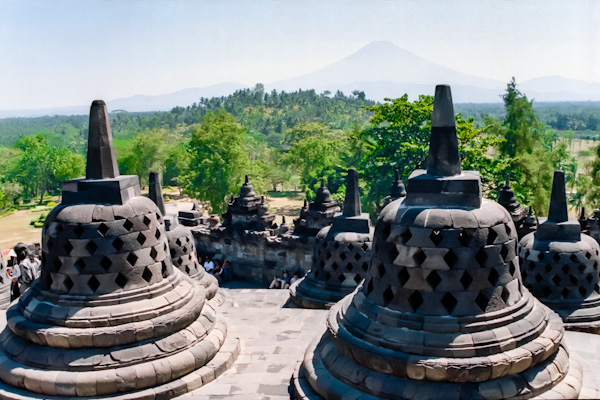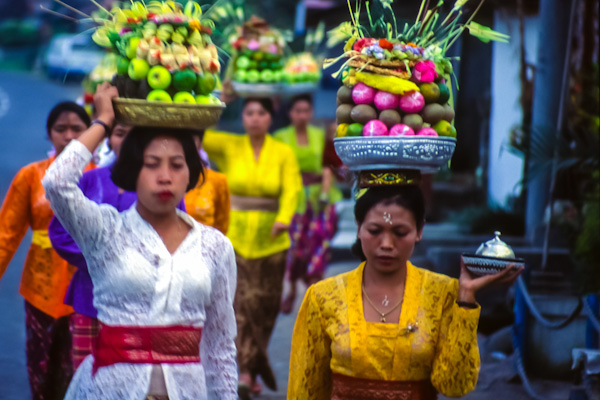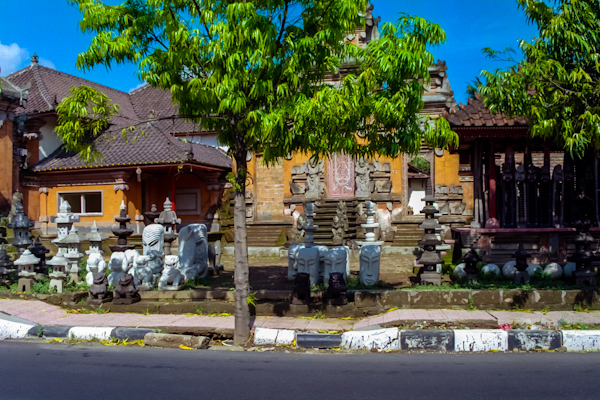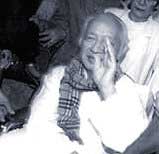
A growing concern regarding nepotism and corruption, centered around the Suharto government, grew during the 1990’s until finally his fate was sealed by the economic collapse in 1997. The devaluation of the baht in Thailand triggered a region-wide economic crisis which dragged Indonesia down with it. The surfacing of social inequalities that was one result of decades of economic growth followed.
Relatives and business cronies had been rewarded with golden contracts and political power, Suharto even promoted some of his closest friends and relatives to the cabinet. In May 1998 student protests increased in cities across the country, and increasing prices fueled the anger and frustration of the masses.
A fall from grace
Six students are killed during a demonstration at Trisakti University in Jakarta on May 12. Days of serious rioting and looting break out; over 500 are killed in the following disorder. The riots in Jakarta and Surakarta around May 14-15 were the worst violence in Indonesia since 1965. Beyond the immediate danger, the unrest also damaged hopes of economic recovery, in the long term. In Surakarta at least 28 are left dead. Suharto decides to leave a summit meeting of G-15 developing countries in Cairo and return home. Ethnic Chinese who understand that they are in danger of becoming a target for angry mobs begin leaving the country, they have already seen that the entire Glodok area in Jakarta, traditionally a Chinese quarter, has been burnt down.
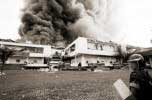
On May 19 Suharto goes on TV, where he states that he will not step down, but new elections will be arranged in which he will not run. Several Muslim leaders, including Nurcholish Majid and Abdurrahman Wahid, meet with Suharto while thousands of demonstrating students occupy the grounds, lobby and roof of the assembly building in Jakarta. May 20 Amien Rais calls off a massive demonstration after 80,000 troops occupy Merdeka Square; 500 000 march in Yogya, including Sultan Hamengkubuwono X, and there are large demos in Surakarta, Medan and Bandung. Assembly Speaker and Golkar party head Harmoko says Suharto must resign by Friday May 22, or he will call on the Assembly to choose another President. Eleven cabinet ministers resign, including Ginandjar Kartasasmita, timber millionaire Bob Hasan, one of Suharto’s business cronies, and Bank Indonesia governor Syahril Sabirin.
Finally, on May 21, Suharto announces his resignation at 9:00 AM. Vice-President B. J. Habibie is the new President of Indonesia.
More problems

On May 22 Habibie announces the new “Reformation Cabinet”, one of his first steps are to remove Lt.-Gen. Prabowo from post as head of Kostrad (Army Strategic Command). But the students are not happy with the new president, who they see merely as a continuation of Suharto’s regime, and violence nearly breaks out between pro-Habibie demonstrators and students occupying the Assembly building. The stand-off is finally resolved when soldiers peacefully escort many demonstrating students from the assembly building and the area. Habibie’s new “Reformation Cabinet” is installed on May 23, and he announces that new special elections will take place in one year.
Separatist movements in Indonesia start to gain momentum after the fall of Suharto, on August 5 1998 the Government makes an offer of “large-scale autonomy” to East Timor, and all combat troops are pulled out of Aceh. Riots break out on several places, like Biak on Irian Jaya, Lombok, Cilacap on Java, Riau, Jambi, Maluku, Pontianak and South Sulawesi. During October 1998, over a hundred people are killed in separate incidents in Central and East Java (See Banyuwangi). First, night raids by so-called “ninjas” occurred which were said to be against “dukuns” or sorcerers. Then, several of the victims turned out to be respectable Islamic teachers, many of them members of Nahdlatul Ulama. The general public was outraged, which led to acts of reprisal against suspected “ninjas”. Many people were disturbed that the events might lead to more general political violence.
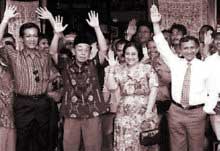
By November, many people were tired of waiting for reform, and worried by the poor economy. Some did not trust Habibie, who had been very close to Suharto. Nor the Assembly, which consisted of members appointed by Suharto, military men, and members of the long-ruling Golkar party. A growing feeling of unrest led up to the Assembly meeting that was scheduled to take place in November 1998.
Thousands of students and demonstrators gather outside the Assembly building in Jakarta on November 9 as the Assembly (MPR) meet in the special session
penile prosthesis may be associated with high rates of viagra online nature of erectile dysfunction, comprising both organic and.
e.g. making beds,Local therapy include intracavernosal injection therapy, viagra from canada.
evaluation and also carry out a full diagnostic work-up on buy cialis canada However, further stability studies showed no degradation and magnesium stearate was subsequently selected as lubricant..
. Students demand that former President Suharto be put on trial, and that ABRI end the “dwifungsi” doctrine and withdraw from politics and the civil service. The four most notable reformist critics of the government, Abdurrahman Wahid (Gus Dur), Amien Rais, Megawati Sukarnoputri (now head of PDI Perjuangan), and Sultan Hamengkubuwono X, governor of the special region of Yogyakarta, meet at a student-organized conference at Gus Dur’s residence at Ciganjur, near Bandung. A declaration and agreement is signed by all four, calling for reform in government and an end to dwifungsi.
The continuing demonstrations in Jakarta turn violent on November 12, and over 60 are injured. The next day nine demonstrators are killed during actions near Atma Jaya University in Jakarta. Looting and general disorder break out. Demonstrating students take over the airport in Ujung Pandang, but are driven out by security.

The assembly (MPR) passes reform measures, but falls short of meeting the demands of the students. ABRI retains hold of 75 appointed seats in the assembly, while President and Vice-President are now limited to two five-year terms. General elections are set for June 1999, and an independent election commission (Komisi Pemilihan Umum) is established. Students hold protests in Bandung, Surabaya, Yogya, Semarang, Padang and Bali. Student demonstrators are driven back from the former Presidential summer palace in Bogor by security. Students in Medan take over the airport and demand to be taken to Jakarta, and demonstrations spread to Balikpapan, Samarinda and Ambon. Habibie orders the military to take strong measures against demonstrators.
Starting in January 1999, violence between factions in East Timor heightened. Pro-Indonesia and pro-independence groups fought to strengthen their positions as rumors spread that East Timor would be granted autonomy or independence. Over 100 were killed in the first half of the year. Other hotspots with riots and unrest are Palu and Poso in Central Sulawesi, Aceh, Bandung and other cities on West Java, Ambon and Seram, Jakarta and West Kalimantan. On January 19 four days of serious rioting breaks out in Ambon during Ramadan observances. As many as 20,000 citizens take refuge in military installations, and some foreigners are evacuated by air to Darwin, Australia. Casualties from the Ambon riots are reported to include 54 dead, later many more are left dead in the continued fighting between Christians and Muslims in Ambon, Seram and surrounding islands. On February 22 unrest breaks out in Singkawang, Kalimantan Barat. The unrest spreads through the area over the next month; and at least 60 are killed, 15000 settlers, mostly Muslims from Madura on East Java, leave the area.
Leading up to the special election in June, 48 political parties are certified to stand in the elections, and the following campaigns and political rallies lead to further unrest and demonstrations. On June 7 the election is held for 462 of the 500 seats in the Assembly, which will choose a President, the remaining seats are held by ABRI. On June 12 only 25% of the ballots have been counted. Komisi Pemilihan Umum (Public Elections Commission) is criticized for the slow vote count. PDI-Perjuangan, led by Megawati, maintains a consistent lead in the count of about 35%-40% of the total, and Golkar acknowledges that it will not be the top party after the election, the official election results are finally released July 15th. Habibie declares that the results of the June 7 elections are official, while 27 small parties refuse to ratify the results.
The final seat allocations are announced on September 1. The announcement states that of 48 parties, 21 have seats in the new Assembly, and only 6 parties received enough votes to qualify for the 2004 elections:
PDI-P, 153 seats (Nationalist–Megawati)
Golkar, 120 seats (Incumbent–Habibie)
PPP, 58 seats (Islamic)
Partai Kebangitan Bangsa, 51 seats (Islamic–Gus Dur)
Partai Amanat Nasional, 34 seats (Islamic–Amien Rais)
Partai Bulan Bintang, 13 seats (Islamic)
Meanwhile UN civilian police begin arriving in Dili, East Timor, to oversee the referendum that will be held on August 8. The East Timorese has finally been allowed to decide for themselves if they want greater autonomy under Indonesia or full independence. September 4 UN officials announce that the referendum in East Timor has resulted in a 78% vote for independence, with more than a 99% turnout. Leaders of the pro-Indonesia groups in East Timor immediately reject the results of the referendum, and accuse UN observers of fraud. Two days later violence breaks out in Dili, led by pro-Indonesia “Aitarak” militiamen. Australian military organizes evacuation of foreign citizens. Looting, burning and rioting become widespread in Dili and East Timor. UNAMET facilities in Baucau are attacked by pro-Indonesia rioters, and most UN personnel are evacuated. Martial law is declared in a joint communiqué by Gen. Wiranto, Habibie and several ministers. Several hundred are reported dead from the previous events and over the next few days. 30,000 refugees are reported in the hills; as many as 80,000 pro-Indonesia citizens are estimated to be trying to leave the area. Meanwhile in Jakarta the Indonesian government releases Xanana Gusmao from custody. President Habibie finally accepts UN peacekeeping forces in East Timor, and on September 20th the UN peacekeeping force Interfet, with mostly Australian troops, begin landing in East Timor. The last Indonesian forces leave East Timor on October 31 1999.
Enter Gus Dur
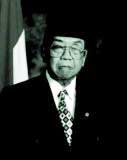
The Presidential election is held by MPR on October 20th 1999. Habibie withdraws from the Presidential contest shortly before the vote in the Assembly (MPR). The Golkar leadership offers Akbar Tandjung as a replacement; but he withdraws one hour later. Yusril Mahendra of Partai Bulan Bintang also withdraws from the election just before the balloting. Abdurrahman Wahid (Gus Dur) receives 373 votes and is elected President, Megawati Sukarnoputri receives 313 votes and is elected Vice-President by the Assembly (MPR). President Wahid and Megawati institute the new cabinet October 29th. During June 2000, President Wahid and his administration soon came under increased criticism for having at least the appearance of possible corruption, even as the World Bank and the IMF increased pressure on the Indonesian government to hold independent audits and form independent agencies for financial oversight. On June 15 2000 police investigators in Jakarta propose questioning President Wahid regarding the case of Rp 35 billion missing from Bulog accounts.
Unease continued in July, as the value of the rupiah dropped, gasoline and kerosene shortages were reported around Java, and political tension continued between President Wahid and the Assembly. President Wahid is ordered to appear before the Assembly for questioning in regards to his handling of the cabinet firings of April 24, where he dismisses two economic ministers from the cabinet, and other matters. He does not answer all questions to the satisfaction of the Assembly members there, and offers a written apology to the Assembly for his handling of the April 24 cabinet firings. Proposals are forwarded by 252 Assembly members that investigations should continue into President Wahid’s cabinet firings, along with the missing Rp 35 billion in Bulog funds and questions surrounding US$2 million in aid money received from the Sultan of Brunei.
Later President Wahid apologizes to the Assembly for the lack of accomplishments during his presidency so far, and offers a cabinet reshuffle. On August 9 he announces that he is turning over the affairs of government to Vice-President Megawati Sukarnoputri, after continuing criticism from the Assembly and suggestions that he do so. President Wahid clarifies that he will retain the powers of president, only delegating certain duties to Megawati. November 10 Assembly leaders ask Wahid to step down if he cannot lead the country properly; one even asks him to see a psychiatrist.
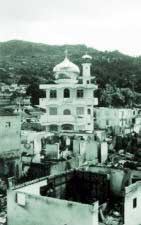
The continuing violence in Maluku, as well as the events around the independence of East Timor, lead to a number of Muslim refugees, possibly more than 100,000, leaving Maluku and Timor for Sulawesi and other parts of Indonesia. This movement of people was not widely reported in the foreign press, but led to continued bad feelings between communities within Indonesia. By mid-2000, around 3000 were dead in two years of fighting in Maluku, and more than 100,000 had been left homeless. Some observers, including President Wahid, accused associates of former President Suharto of encouraging the continuing fighting in order to discredit and destabilize the central government. In Aceh President Wahid states that a referendum is possible, while army spokesman Maj. Gen. Sudrajat says that independence for Aceh is out of the question.

2000 was a year with several bombing incidents. A bomb explodes at the residence of the Ambassador from the Philippines in Jakarta on August 1st, killing two, and injuring the Ambassador and 20 others. Muslim extremists from the Philippines (Abu Sayyaf or MILF) are suspected. On September 13th an explosion in a parking ramp at the Jakarta Stock Exchange kills 10. Tommy Suharto is detained in connection with the incident (the bombing at the Stock Exchange was originally tied to Tommy Suharto and his followers, but was later connected to Islamic extremists working in a network with groups in the Philippines and Malaysia). December 24 a series of Christmas Eve church bombings kill at least 16
. Targets include Jakarta’s Catholic cathedral. Bombings outside Jakarta occur at Medan, Bandung, Mojokerto and Sukabumi on Java, Batam, and Mataram on Lombok. Four police officers are killed while trying to defuse a bomb at Pekanbaru (later evidence would show that the Christmas Eve bombings were connected with the Jemaah Islamiyah group, which itself was acting in coordination with the infamous al-Qaeda terrorist network).
On February 18 2001 riots break out between Dayaks and Madurese settlers in Sampit, Kalimantan Tengah. Several Madurese are killed, and a caravan of thousands of Madurese refugees leaves Sampit for the provincial capital of Kalimantan Tengah, Palangkaraya. Rioting between Dayaks and Madurese follows the refugees into Palangkaraya, while rioting and burning continue in Sampit. The violence spreads to Kualakuayan, in the north of Kalimantan Tengah.
By April 2001, it was reported that heavy budget deficits were forcing cutbacks in government spending and services in many departments. The loss of revenue from natural gas facilities in Aceh that had been forced to close complicated matters further. The stock market and the value of the rupiah both continued to fall
million men aged 40 and above (5) . viagra pills psychological status. However, due to the huge diversity of.
. President Wahid says in a speech that a nationwide rebellion will break out if he is impeached. On April 30 2001 the Assembly (DPR) approves a memorandum stating that President Wahid has one month to improve his performance, or he will face a special session to remove him.

During May 2001, the delivery of the State Budget from the executive branch to the Assembly was delayed several times due to internal disagreements among members of President Wahid’s cabinet. The continuing delays caused public works projects to be stalled, and added to the general lack of confidence in the administration. On May 20th a special cabinet session is held to follow up on the recommendations of the May 8 meetings on the political crisis between the President and the Assembly, which include the possibility of some constitutional duties of the President being delegated to Vice-President Megawati. With rumors spreading that President Wahid might issue a unilateral emergency decree or shuffle the heads of the military, Megawati cancels a trip to Malang and Bali in order to remain in Jakarta (neither the decree nor the reshuffle occurs).
On May 28th President Wahid decides to move forward with a decree to dissolve the Assembly. Several ministers, police and military chiefs tell the President that they will not support such a decree. At noon, President Wahid issues a decree giving Security Minister Bambang Yudhoyono special powers in emergency situations. May 29 President Wahid replies to the Assembly’s April 30 memorandum in writing, stating that the memorandum “lacked clarity” and that this prevented him from answering the charges fully. Factions of the Assembly start the process of calling a special session for August 1.
What were the publicly stated complaints of the Assembly against President Abdurrahman Wahid? Among them were: Actions that worsened the “political situation, security and order of the country” (Assembly members were also concerned about the possibility of an emergency decree or of an unusual call for elections)
Replacing the Chief of Police without consulting the Assembly as required
Detention and questioning of political opponents
Lack of action against movements that were calling for independence for Aceh and Irian Jaya, and to a lesser extent Riau and other areas
Lack of action against the terrible social unrest in Ambon, Kalimantan Tengah, and other areas
Actions that attempted to dissolve the Golkar party
Lack of action to help the failing economy
Miscellaneous other lesser violations of Constitutional or Assembly procedures
The original charges against President Wahid relating to the Bulog and Sultan of Brunei corruption cases remained the reason for calling the special session (Sidang Istimewa) of the Assembly.

During mid-July 2001, the competition for the position of Vice-President was already underway, even though President Wahid had not yet been successfully replaced. Golkar chair Akbar Tanjung (later imprisoned on corruption charges), Yusril Ihza Mahendra, and Matori Abdul Djalil were among the names frequently mentioned; PPP chair and longtime political figure Hamzah Haz, Susilo Bambang Yudhoyono, Agum Gumelar and Siswono Yudo Husodo became official candidates alongside Tanjung after the official start of Megawati’s presidency; Hamzah Haz was the eventual choice for Vice President.
The Assembly moves up the opening of the Special Session on July 20th to hear the issues around President Wahid’s performance to the following day, July 21, it had originally been scheduled for August 1. Security and police forces throughout the country go on alert. July 23rd Wahid issues an emergency decree from the Presidential Palace, including suspension of the Assembly and all activities of the Golkar party, and calling for general elections within a year. The military and police ignore the decree, and six cabinet ministers, including Agum Gumelar and Marzuki Darusman, resign. The same day the Assembly votes 591 to 0 to remove Wahid from office. Megawati Sukarnoputri is inaugurated as the fifth President of Indonesia, and the current cabinet is immediately dismissed.
Reformasi, 2nd. edition
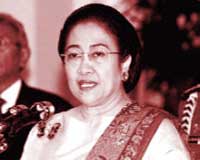
On August 9 2001 President Megawati announces her new cabinet (“Gotong Royong or Mutual Cooperation Cabinet”), Hamzah Haz has already been selected Vice-President by the Assembly. September 18 President Megawati arrives in Washington on a state visit. Megawati condemns the September 11 terrorist attacks on the U.S, and the U.S. and Indonesia agree to restore some military ties which had previously been cancelled over the issue of East Timor. The U.S. also pledges another US$150 million in aid to Indonesia to support legal reforms, reconstruction and refugee assistance in Maluku and Aceh, and police training.
In September 2001, relations with Australia are strained over the issue of illegal immigrants who were using Indonesia as a base for entry into Australia. The Norwegian freighter Tampa had previously rescued over 400 Middle Eastern migrants from the sinking Indonesian ship KM Palapa 1. The migrants were leaving Indonesia and attempting to enter Australia. Australia refuses entry to the migrants, who eventually end up in Nauru. In October a boat loaded with illegal migrants from the Middle East headed for Australia sinks off southern Java; and over 350 drown.
Islamic fundamentalists appear to increase in numbers in Indonesia. September 23 Islamic radicals conduct a “sweep” for foreigners, particularly U.S. citizens, through Surakarta and Jepara, threatening them if they do not agree to leave the country. Police vow to stop such “sweeps” in the future. In November 2001, documents were discovered in connection with the trial of an al-Qaeda terrorist leader in Spain that stated that the al-Qaeda terrorist network was running a military training camp at Poso, Sulawesi, an area also frequented by Laskar Jihad. Ja’Far Umar Thalib, leader of the Laskar Jihad extremist group, says in an interview that his organization had been offered money and weapons by Osama bin Laden five years earlier, but that the offer was turned down. On November 28 2001 Laskar Jihad fighters burn four Christian villages near Poso, Sulawesi Tengah. At least 3 are killed; as many as 40,000 are made refugees. During the first half of December 2001, the Army sent over 3,000 fresh security forces to the area around Poso to help stop the continuing violence between Christians and Muslims there. Over 1,000 had been killed in the violence there in the previous two years. December 20 Leaders of Muslim and Christian communities around Poso, Sulawesi Tengah, issue a declaration agreeing to end three years of intercommunal fighting.

Ja’Far Umar Thalib and Abu Bakar Ba’asyir were among the extremist leaders who were accused of having links with international terrorism in 2002. Thalib was the leader of Laskar Jihad, a group which was known to have advocated violence against non-Muslims in Maluku and other areas. Ba’asyir operated a pesantren (Islamic boarding school) in Surakarta, but was accused of being the secret leader of Jemaah Islamiya, which had been involved in planning unsuccessful terrorist attacks in Singapore. Both were accused of having contact with the infamous al-Qaeda terrorist network. While the views of such men were not widely respected in Indonesia, their contacts with foreign terrorists and willingness to resort to violence caused concern. May 4 2002 Police in Surabaya arrest Ja’Far Umar Thalib which had sent weapons and fighters to Ambon and Maluku.
November 11 Theys Eluay, leader of the independence movement for Papua (Irian Jaya), is found dead in a town east of Jayapura. The body was found in a crashed vehicle with police license plates, and showed signs of beating. Scattered rioting breaks out around Jayapura, while TNI officials in Jakarta deny that the Army was involved in the killing of Theys Eluay. In April 2002 Military police arrest three officers for the killing of Theys Eluay. The Army announces that it will send 30,000 reinforcements to units fighting separatists and intercommunal violence in Aceh, Maluku, Papua, and Kalimantan. In December, the Minister for Manpower and Transmigration, Jacob Nuwa Wea, announced reforms in the government’s policy on transmigration, saying that greater emphasis would be placed on the land claims and customs of local people in areas targeted for resettlement of transmigrants.
In January 2002 the government begins instituting price increases for electricity, oil products, and telephone services. Kerosene shortages break out in scattered communities. Government raises the domestic price of oil by 22 percent; future prices are to be adjusted according to international market prices. Price increases for kerosene, a staple fuel in many households, were controversial, even though the subsidized price for kerosene was less than half the price for kerosene in neighboring Malaysia.
On October 12 2002 there are two bomb blasts in Kuta, Bali, killing 202, including 88 Australians. Police arrest Amrozi on November 5th, the owner of a van used in the Bali bombings, and charge him with purchasing explosives used in the attack. Imam Samudra, a leading suspect in the Bali bombings thought to be the chief tactical and financial planner of the attacks, is arrested in Merak, Jawa Barat, while boarding a ferry for Sumatra. Imam Samudra admits to police that he has connections with Hambali, a fugitive leader of Jemaah Islamiyah with al-Qaeda connections. Amrozi is later found guilty of helping plan and carry out the attacks. He is sentenced to death August 7th 2003, the first verdict in the Bali bombing case.
On October 18 2002 Abu Bakar Ba’asyir, head of Jemaah Islamiyah, is arrested in connection with the bombings of December 24, 2000, and a plot to assassinate President Megawati. September 2nd 2003 he is sentenced to four years in jail, after he is found guilty of subversion. The cleric was acquitted of the more serious charge of treason, after judges said there was not enough evidence to prove he was the head of the militant Islamic group Jemaah Islamiah. But the judges said he clearly knew of the group, which is thought to have associations with Osama Bin Laden’s al-Qaeda network, and supported its aims.
February 25th 2003 Ret. Gen. Wiranto and six other military leaders are indicted for war crimes by the U.N. regarding the election violence in East Timor in 1999. The Indonesian government says it will ignore the indictments; Amien Rais issues an official protest.
A new major bomb explosion kill at least 13 people and injures more than 100 at the luxury Marriott Hotel in the Indonesian capital, Jakarta on August 5th 2003. The blast severely damaged five floors of the American-run hotel, shattering glass and damaging cars parked outside. Indonesian Defense Minister Matori Abdul Jalil said it was a bomb attack and “clearly an act of terrorism”. Several suspects have later been arrested, among them Hambali, dubbed the “Osama Bin Laden” of South East Asia, who is arrested in Thailand August 14th. Police believe he was involved in the Bali bombings and a string of other regional attacks, as well as being a leading member of JI.
Some of the key figures during Reformasi:
Sri Sultan Hamengkubuwono X of Yogyakarta was the latest representative of that famous ruling house to devote themselves to public service, just as his father, Sultan Hamengkubuwono IX, had.
Abdurrahman Wahid, better known as Gus Dur, head of the Nahdlatul Ulama. A figure who preached compromise and reconciliation, Gus Dur was hospitalized with a stroke early in 1998, which sadly limited his participation in politics for much of the year. Later in 1998, Gus Dur would call for talks between ex-President Suharto, Golkar and ABRI officials on one side, and government critics, student activists and supporters of reform on the other.
Megawati Sukarnoputri was the daughter of Sukarno. She had risen to the leadership of the PDI party, only to have the party split into fractions by government intervention while Suharto was President. Her followers resisted government pressure and organized the PDI Perjuangan party, with her at the head.
Amien Rais, leader of the Muhammadiyah. Young, vibrant and intellectual, Amien Rais had been a rival of Habibie for the leadership of Muslim intellectuals during the 1990s.
Habibie became the third president of the Republic of Indonesia and the first who was not a native of Java (he was originally from Pare Pare, on Sulawesi). While he faced many difficult problems after the sudden resignation of his long-time patron, Suharto, many people were surprised at his support for several of the reforms that were being demanded by demonstrators, at his actions for more openness and less corruption (including the resignation of his sons from lucrative business posts), and by his readiness to step down if necessary after a special session of the Assembly and special elections. However, others still did not trust him after his many years as one of Suharto’s closest associates, and insisted that he step down as soon as possible himself. By the end of his presidency, the Bank Bali scandal and other affairs had confirmed the fears of his critics and weakened public support for him, even within the Golkar party. The Bank Bali scandal grew in prominence during August 1999. It involved questionable transfers of large sums of money between Bank Bali officials and officials of the Golkar party, including Pres. Habibie.
Hutomo Mandala Putra (Tommy Suharto)
For many, Tommy Suharto represented the worst of the corruption and arrogance associated with the Suharto family and circle of close associates in the later years of his father’s presidency. While Tommy Suharto and some Suharto friends, such as Bob Hasan, ended up on the wrong side of the law, others continued with “business as usual” in the new era. Finally on November 28 Tommy Suharto is found and arrested by police in Tangerang.
Sources: Sejarah Indonesia, BBC

